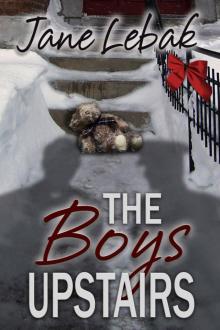- Home
- Jane Lebak
The Boys Upstairs (Father Jay Book 2) Page 10
The Boys Upstairs (Father Jay Book 2) Read online
Page 10
Holly glanced once move over her shoulder as they left the park, looking at the tree, grateful for second chances.
Thank you so much for reading The Boys Upstairs!
Please consider leaving a review at Amazon. Forget what your 4th grade teacher told you about book reports: a review can be just a couple of sentences, and authors will love you for it. (Particularly this one.)
If you'd like to learn about my other books or hear from me when new books appear, please sign up at my mailing list. (If you do, I’ll send you a free copy of the Seven Angels Short Story Bundle). I'd also love to see you at my Facebook page.
The Boys Upstairs is dedicated to fellow-writer, artist and friend, Wendy Dinsmore. She encouraged me to keep writing this story from the very start, and she loves the characters as much as I do.
Thanks again for reading my story, and be sure to read the next Father Jay book, A Different Heroism.
Also by Jane Lebak: Half Missing.
A story of sisterhood, identity, and separated soulmates.
“I think you have a twin.”
Amber Brickman used to dream of unearthing ancient civilizations with her soulmate. But now she's the Assistant Fire Marshal, sifting through burn sites while the walls are still warm, looking for evidence of arson. It's the life she's pieced together after her fiancé was murdered just weeks before their wedding. Ashes are easier to sort out than broken hearts, and paperwork doesn't leave you lonely.
She's not asking for more, but she's about to get it when her mother sees a woman on the news who looks and sounds just like her. Her mother is convinced she's found Amber's twin, stolen at birth.
Amber wants nothing to do with this insanity, but the more she resists, the more her mother delves into the past, desperate for the truth no matter what the cost. The only way to find it may be to open up and risk everything -- her job, her heart -- but digging up her past will be trickier than any burnt-out building.
Jane Lebak's novels have taken readers through the realm of angels and the funnier sidestreets of New York City. In Half Missing, she explores how the past impacts on the present, and how the losses of three different women can braid together into a stronger future.
One
Amber’s work boots crunched over the charred carpet as she moved past a hostess station to what used to be a dining area. Flashlight in hand, she traced the length of the fire-gutted wood beams supporting the ceiling, just to be sure. The roof was waterlogged, and seven AM was far too early to die.
The firefighter at her side said, “The Chief had a structural engineer come in. It’ll hold. Just don’t book a wedding.”
“Not a chance.” While the dining room must have been gorgeous about eight hours ago, right now it crumbled underfoot and stank of smoke. Her light skittered across something recognizable as a pile of menus. Several tables were broken, their linens blackened. Amber hesitated as a chair leg snapped beneath her boot. Between the smoke and the water damage, they’d salvage nothing.
No, don’t think about that. Salvage wasn’t her concern. Until she proved otherwise, this was a crime scene.
“I’m heading for the kitchen. I assume that’s where it started.” Amber hefted her shovel and aimed toward the back of the room, choosing her steps to disturb as little as possible.
Grit clung to her jeans. Her gloves had already gotten soot on them, and when she adjusted her hard hat, ashes flurried into her eyes.
In the doorway, she bit her lip in the face of the devastation. The ceiling sagged toward the back wall, where everything was black, black, black. Awful—but, really, her job dealt in awful. “Hey Rick, do you know how long it burned?”
The firefighter shrugged. “Not sure about how long before, but say a half hour. We fought it for ten minutes, and then it hit flashover.”
Amber flinched. “Everyone got out okay?” Flashover was the bane of firefighters everywhere. Any time the air inside a building got hot enough to ignite everything at once, that was just as bad as it sounded. Temperatures had to have reached twelve hundred degrees in here. Maybe more.
Rick nodded. “Yeah, we were fine. It took another half hour until we finally knocked it down. The Chief was about to call Elmira for backup.”
Amber picked her way among the fallen beams and the smoke-streaked appliances. It wasn’t just her imagination: this place was still warm. She scanned the kitchen again. Over there would have been a row of stoves to cook for two hundred people; those had been refrigerators; that was the walk-in cooler off the side. Utility sinks. Pans heavy enough to deck a gladiator, plus knives sharp enough to do him in if the pan failed.
She squared her shoulders. “We’re good. I’ll take it from here.”
Behind her, Rick said, “Are you sure?”
She pivoted, cocking her head. “Come on.”
It flashed across his face, the hesitancy at leaving a young woman alone at a burn site. This happened often in her two years as a fire investigator. It was her height (or lack thereof) and the slight upturn of her nose, the way her voice sounded younger than she was. Sometimes it felt like the whole fire department and half the police thought of themselves as her dad. She said, “Safety’s my job.”
Rick nodded, and then she was alone.
Nothing was left of the oven mitts, the linens, the sponges. Wires: melted. Fixtures dangled from wires or had already crashed to the floor. There, a set of truly amazing chef’s knives, their handles scorched. But certainly the fire had started in here, so she traveled out and back again to bring her equipment, first lighting a pair of battery-operated lanterns and setting them strategically to study the burn patterns.
Based on the report she’d already had, she wasn’t going to determine much on those alone. Given that the kitchen reached an internal temperature of over twelve hundred degrees, anything that could burn had ignited simultaneously just from the heat in the air and walls. Then after flashover, it had burnt for so long that everything was charred.
She checked out the windows, all double-paned and effective for keeping down the heat bill during an upstate New York winter, and equally effective for keeping heat in while the place burned. Moreover, they were still shut, so there hadn’t been any attempt to release the heat by ventilating the room.
Scorched insulation was visible through a gap in the ceiling, and it was the good stuff. Again, spectacular for retaining heat, and it burned incredibly hot.
It was a shame. The restaurant had seemed nice enough, with a jazz band on Friday and Saturday evenings, and Italian food that would make you feel at home if only you could have afforded it. Plus it had employed what, twenty people? Regardless, it was a mismatch to a small town with no industry, where a hole-in-the-wall mom and pop diner (and grandpop and great-grandpop) did fine selling a three-egg breakfast special—extra toast for twenty-five cents. By contrast, a high-end Italian place was sure to fail. You just never wanted it to happen, and certainly not like this.
The building, not so much. She always looked at these square, faceless and character-free structures and tried to imagine that when the building was new, someone actually loved it. Cared for it. Didn’t believe it was just a rectangle with windows and a door.
Fifteen minutes later, on a trip back past the caution tape for her shovel and some specimen jars, a car pulled up behind her. Shivering in the frost, she turned as the driver stepped out, a man in a mortal pallor.
This was the moment she dreaded: when the owner got that first look, that first whiff. But she forced herself to take note of his features, the inverted V of his eyebrows, his quivering mouth.
She rubbed her hands on her jeans as she approached. Pulling her ID from her back pocket and showing him her shield, she said, “I’m Amber Brickman, from the Tioga County Fire Marshal’s office. I’m the arson investigator.”
“Arson!” The man’s eyes flew wide. “Someone set this?”
“I can’t answer that,” Amber said, “but the investigation is standard procedure, and it does
n’t mean we suspect wrongdoing. The State requires I track down the source of the fire and make a determination as to the cause, whether it was deliberately set.”
She could have counted down the seconds until he put it together, and how he’d react with horror because he’d know the law. An insurance company wouldn’t reimburse a dime if she ruled he’d burned his own place to the ground.
Sure enough, he looked nauseated. “What are you going to do?”
She really ought to tell this guy to get out of here so she could do her job. He was only going to muck things up. Either he’d caused this fire or he hadn’t, and either way, he was going to try to convince her he hadn’t.
Instead she put away the Fire Investigator tone, and in a lower voice, said, “What’s your name?”
“John. John DelGaudio.”
“Mr. DelGaudio, I’m going to take samples from the structure, and I’m going to send them to a lab. We’re going to test for accelerants.” He looked relieved. “I’m going to study the burn patterns and figure out where the fire started. I’m going to interview the firefighters as to how the fire behaved while they were putting it out. And based on those cues, I’m going to make a determination.”
Eyes wide, he bit his lip. “I didn’t do this.”
“You know what?” Amber said. “I believe you.”
His eyes closed.
“But the thing is, sir, if I don’t do this investigation, your insurance company will claim they don’t have to pay what you’re owed. So I’m going to do the most thorough study in the history of Patmos Springs. I’m going to interview you. I’m going to interview your employees. That doesn’t mean I think anyone’s guilty. What it means is that when I write that report, I want it airtight.”
Still staring off at a collapsed wall, he nodded.
“Oh,” she said, “by the way, the windows—they looked new.”
He gave a rueful smile. “I replaced them six months ago.”
“Along with the insulation?”
He nodded. “We redid the whole kitchen.”
The guy had been pouring money into this place. That’s not what you do when you want it destroyed. “I can’t have you in there alone,” Amber said, “but if there’s anything you want to retrieve right now, I’ll call the Fire Chief so one of the guys can escort you. The office toward the front was spared the worst of the damage.”
As Amber got out her phone, DelGaudio said, “Did you ever eat here?”
Amber paused mid-dial. I had reservations once, the week you opened. I ended up at my date’s funeral, instead.
She only said, “No, I’m sorry. I can tell how much you loved the place.”
Once she had DelGaudio squared away, Amber went back inside with her shovel, her notebook, and a bunch of jars. Time to lock up the guesses and dig for the facts. People who burned down a building took steps to help it along. It seldom occurred to them those steps left chemical footprints.
A little after nine o’clock, in the middle of filling her seventh jar, a voice called, “What a surprise meeting you here, Brickman.”
She laughed, screwing the top on the sample jar. “A total stunner, finding the Fire Marshal’s office at the scene of a fire. Even more surprising than finding the insurance adjustor.”
She extended a hand, and Lance Harrington shook it without recoiling from the grit on her glove.
“Not much left to adjust.” He shook his head. “DelGaudio did a thorough job.”
“This wasn’t arson.” Great. Now she’d have to fight with an insurance company. “I know you get paid the big bucks to say it is, but there’s no evidence.”
Harrington stuck his hands in his jeans pockets and looked around. “The restaurant was flailing. He’d changed up the menu three times in five weeks and was trying to bring in sushi and, heaven help us, karaoke. DelGaudio had one month maximum before he declared bankruptcy. So he did what any reasonable man would do and had an insurance fire.”
“And I’m telling you there’s no evidence.” Amber gestured around. “You can speculate however you like, but my job is to prove it, and there’s no proof.”
“The burn pattern.” Harrington swung his flashlight over the floor. “If the fire starts in the center of the floor, someone set the fire. The burn seems deepest there.”
“Except the kitchen burned for well over ten minutes after flashover.” Amber folded her arms. “If the kitchen hadn’t burnt for that long, I’d agree with you. But given the timeframe, you expect to see the center gutted. Moreover, there’s double-insulated windows and brand new insulation in the ceiling. And no venting. What other burn pattern are you going to see?”
Harrington peered right into Amber’s eyes. “You mean to tell me that somehow, just totally by coincidence, a man’s restaurant burns to the ground mere weeks before he’d have lost everything?”
“Yeah.” She smirked. “Almost enough to make me believe in God.”
She turned her back and lifted the shovel.
Harrington was too nice a guy to sound really threatening, but he tried. “If you rule it’s not arson, I’ll fight your determination.”
“Oh, gee, it sounds like I’m going to get in trouble again at my job.” She pivoted, and looking him in the face, she steeled herself: he would not take the easy way out. “I can’t call something a crime when it wasn’t. You’re working on intuition, but you learned your trade on buildings that got extinguished before they burned too long. That’s bad science. Our jobs are to protect the people, but I have to make sure we’re not protecting the wrong people.”
Harrington huffed. “You think you can figure out this mess?”
“Ninety-five percent of the time, the past is written in the present. Come see.” Amber trudged over to a row of appliances that used to be stainless steel. Turns out twelve hundred degrees can stain it. She yanked a handle and tuned her flashlight beam onto the racks of dishes. Clean. “Pretty, huh? Plates in this one.” She opened the next. “Crystal glasses. Perfectly clean.” She yanked open the third. “Lovely. Except there’s smoke on these, and there isn’t on the other two.”
Harrington said, “And—? You just said the place burned for at least forty minutes.”
She whacked a hand against the body of the dishwasher. “These babies are watertight, and the frames are steel. Nothing’s getting in there. That’s part of the point: they keep the water in, and when they dry the dishes, they keep the heat in. DelGaudio bought the best of everything: the best windows, the best insulation, the best dishwashers. You’ve got three dishwashers side by side, and two of them kept out the smoke, but one was filled with it.” She slammed the door and kicked the unit. “What do you do if you’re running a restaurant? Well at two AM you’ve booted out the last diners. Your staff has finished cleaning. You’ve loaded the last dishes, so you turn on all three dishwashers, and you go home.” She opened her hands. “The unit is designed to produce heat when it’s drying, and if one of these malfunctioned, it would burn inside that stainless steel frame until it got so hot that it spread to the floor, and then, yeah, you’d have a burning floor. No accelerants necessary. The cycle on these things runs what? Two hours? And when did the fire get called in? About four-fifteen AM.”
Harrington bit his lip. Victory.
“See? The past is written in the present.” The look on Harrington’s face was the look of a man needing to put a value on the food in the walk-in fridge and decide whether a two-week-old karaoke machine had depreciated. “I’m getting samples, and I’m going to test the hell out of the place, but I know what I’m going to find.”
“You’ve convinced me.” He took a step, then turned back. “Okay, but now you have me curious. If a guy getting saved from losing everything by a malfunctioning dishwasher is almost enough to have you believe in God, what would it actually take?”
Amber looked at him over her shoulder, eyes narrow. “Raising a guy from the dead.”
Harrington grinned. “I think at least one major religion
has that.”
“Wrong guy.” She bent to get another sample. “You’ll have a copy of the report as soon as it’s written, even if the Old Man wants my head in a bag again.”
“He’d never put your head in a bag,” called Harrington as he left. “You’re the reason he can stroll around checking smoke detectors rather than spending mornings out here with a shovel.”
Amber collapsed into the driver’s seat of her Subaru Outback. At nearly noon, she’d already spent four hours investigating the remnants of that restaurant, and her back ached.
Two calls had come in on her cell phone while working, both of which she’d sent to voicemail. The first was from her sister Olivia. “So, um, you may want to cover up your head or run over your phone. Mom had a great idea: you need to buy a house. She says a sign went up for sale on a nice starter home on Curve Street.”
Oh, yeah, the old Martin place. Three bedrooms, tiny overgrown yard with blackberry brambles engulfing what used to be a white picket fence. Mom might be in need of a hobby, but at least she’d picked a place with charm. Of course Amber would love nothing more than to snow-blow her walk every morning from November to April and maintain a three-bedroom gable all by herself for the next sixty years.
“She says there’s even room to grow a garden, which I know is something you lie awake every night wishing you could do, right? Right. Well, I warned you. You can thank me later.”
Amber gave that message all the attention it deserved: she deleted it. She proceeded to the second, and the number that showed made her stomach lurch.
“Hello, Amber,” began the message, and then, as if Amber could ever forget this voice, “This is Carmen Mateo.”
Amber’s fingers tightened on the phone, and she set her jaw.
“I hope you’re doing well,” Carmen continued, “and I’d love to catch up with you sometime.”

 Bulletproof Vestments
Bulletproof Vestments The Wrong Enemy
The Wrong Enemy The Boys Upstairs (Father Jay Book 2)
The Boys Upstairs (Father Jay Book 2) Sacred Cups (Seven Archangels Book 2)
Sacred Cups (Seven Archangels Book 2) Bulletproof Vestments: A Father Jay Story
Bulletproof Vestments: A Father Jay Story An Arrow In Flight (Seven Archangels Book 1)
An Arrow In Flight (Seven Archangels Book 1) Upsie-Daisy
Upsie-Daisy Shattered Walls (Seven Archangels Book 3)
Shattered Walls (Seven Archangels Book 3) Pickup Notes
Pickup Notes